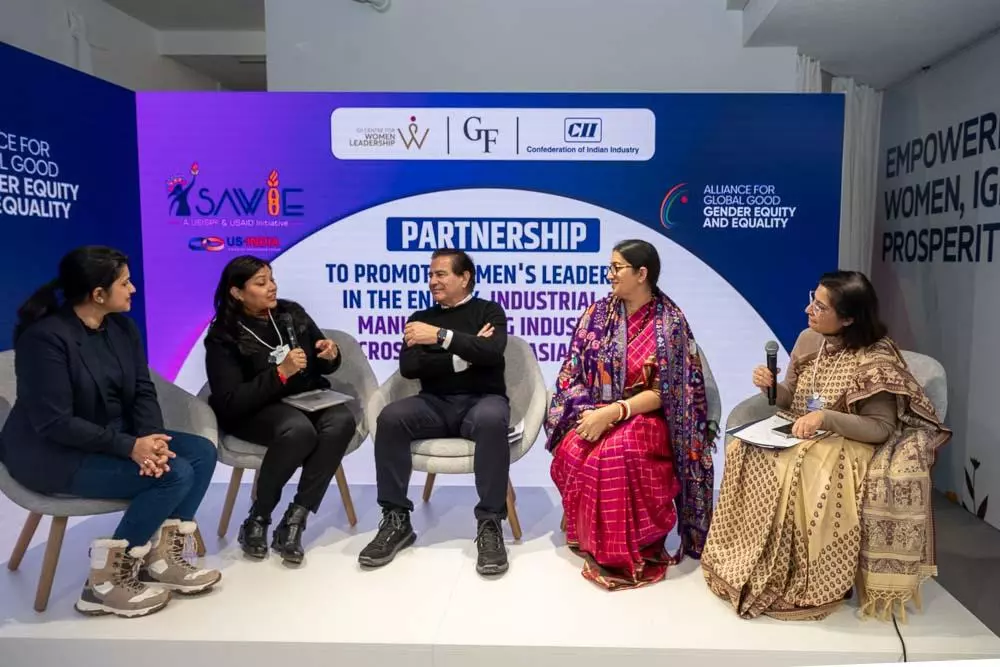Smriti Irani Leads a Transformative Gender Equity Agenda at Davos 2025

Davos, Switzerland 25th January 2025 Smriti Irani, Chairperson of the Alliance for Global Good: Gender Equity and Equality, emerged as a transformative force, leading several key initiatives on Gender Equity and Equality agenda at Davos along the sidelines of the World Economic Forum (WEF) 2025, championing gender equity as a critical driver of global economic growth and social progress.
With an agenda grounded in actionable solutions, Ms. Irani’s leadership at the summit highlighted the moral imperative of gender parity and showcased its undeniable business case. Through a series of high-profile engagements with world leaders, industry titans, and media influencers, Ms. Irani advocated for embedding gender equity into global economic frameworks. Her narrative was clear and resonant: Gender equity is more than a societal aspiration; it is an economic necessity capable of unlocking trillions in global GDP.
In a pivotal meeting with Singaporean President Tharman Shanmugaratnam, Ms. Irani discussed innovative policy frameworks, including gender-responsive trade agreements and integrating women entrepreneurs into global value chains. This dialogue laid the groundwork for collaborative solutions, leveraging Singapore’s policy expertise and the Alliance’s grassroots momentum.
An impactful meeting with Bill Gates further reinforced the Alliance’s mission to create systemic change. The duo explored collaborative approaches to dismantle barriers in healthcare, digital skilling, and leadership. Mr. Gates expressed strong support for the Alliance’s data-driven strategy, emphasizing scalable solutions with measurable impact.
Ms. Irani’s meeting with Børge Brende, President of WEF, marked a reflective moment, highlighting the Alliance’s achievements since its inception in 2024. She emphasized milestones such as the Commonwealth Partnership for gender-inclusive programs and the SAWIE (South Asian Women in Energy) initiative, a collaborative effort to amplify women’s leadership in the energy sector.
Ms. Smriti Irani’s leadership shone brightly during WEF sessions that seamlessly combined data-driven insights with human stories of resilience. The session “Women at the Fulcrum of Global Economies,” moderated by Ms. Smriti Irani and co-hosted by the Bill and Melinda Gates Foundation highlighted women’s control of 50% of global wealth by 2030 and the importance of tapping their potential by integrating women into the workforce, with data suggesting it could contribute an additional $1.6–$2.3 trillion to global GDP.
At the Alliance’s flagship “We-Lead Lounge,” Ms. Smriti Irani convened global stakeholders to address critical gaps in leadership and representation across technology, healthcare, and sustainability. The discussions, ranging from the future of work to women’s role in climate action, yielded commitments to skilling initiatives and gender-inclusive policies.
A hallmark of Ms. Irani’s strategy was her focus on measurable impact. Collaborations with corporate leaders like Naspers CEO Phuthi Mahanyele-Dabengwa and Salesforce SVP Naomi Morenzoni emphasized equipping women with digital skills to lead in emerging sectors such as technology and e-commerce. These discussions laid the foundation for long-term initiatives aimed at integrating women into the digital economy.
Ms. Smriti Irani also prioritized healthcare advancements, partnering with organizations like GAVI and the Coalition for Health Innovation and Collaboration (CHIC) to expand access for underserved women globally.
Recognizing the power of media in driving systemic change, Ms. Irani collaborated with TIME Magazine’s Viktoria Degtar and others to amplify women’s leadership stories. These efforts aimed to ensure that women’s contributions resonate globally, shifting narratives and creating inclusive platforms for recognition. At Davos 2025, Smriti Irani demonstrated a results-oriented approach to fostering sustainable, inclusive growth. Her leadership cemented the Alliance’s position as a global catalyst for gender equity, setting a pragmatic, scalable model for economic and social transformation
